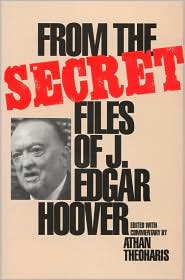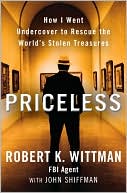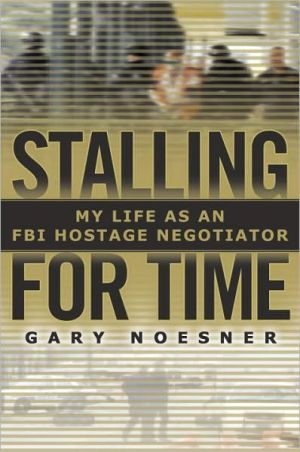From The Secret Files Of J. Edgar Hoover
Documents uncovered from the late FBI director's secret files reveal for the first time the shocking extent of FBI activities in collecting and using derogatory information about prominent Americans and political groups. Historian Athan Theoharis charges that Hoover was an "indirect blackmailer," exploiting the FBI's resources to serve the political interests of the White House and to advance his own political and moral agenda. None of the documents in five separate secret files was intended...
Search in google:
During his forty-eight years as director of the Federal Bureau of Investigation, J. Edgar Hoover scrupulously maintained secret office files and arranged for special filing procedures to safeguard "sensitive" information. None of the documents in five separate files was intended ever to be disclosed. Athan Theoharis, one of the FBI's most diligent critics, secured these materials after intensive research in FBI files using the Freedom of Information Act. Published here with supporting documents and Mr. Theoharis's authoritative comments, they reveal the shocking extent of FBI activities in collecting and using defamatory information about prominent Americans and political groups. Publishers Weekly These selections from Hoover's official and confidential file, obtained under the Freedom of Information Act, reveal how the former FBI director was able to advance his own bureaucratic, political and moralistic agenda by ``indirect blackmail'' throughout his 48-year tenure. Excerpts from memoranda, letters and phone transcriptions include FDR adviser Harry Hopkins's entreaty that the Bureau wiretap his residence and tail his wife; compromising conversations between Navy ensign John Kennedy and a gossip columnist suspected of being a German spy; Nixon staffer H. R. Haldeman's request for ``a rundown on homosexuals known and suspected in the Washington press corps''; and the full text of the notorious FBI-written letter encouraging Martin Luther King Jr. to commit suicide. As Theoharis aptly remarks, these files document the perils that unelected officials can pose for a constitutional government. Hoover's willingness to authorize illegal investigative techniques is clearly revealed here. Theoharis is a professor of history of Marquette University in Milwaukee, Wis. (Sept.)
\ Chicago TribuneFascinating...this book simply cannot be dismissed.\ — Stanley Kutler\ \ \ \ \ NewsdayHoover may have died without leaving us an autobiography that might have enriched history and gossip, but that loss has been handsomely repaired by Professor Athan Theoharis.\ — Murray Kempton\ \ \ The New York TimesValuable.\ — Herbert Mitgang\ \ \ \ \ Publishers WeeklyThese selections from Hoover's official and confidential file, obtained under the Freedom of Information Act, reveal how the former FBI director was able to advance his own bureaucratic, political and moralistic agenda by ``indirect blackmail'' throughout his 48-year tenure. Excerpts from memoranda, letters and phone transcriptions include FDR adviser Harry Hopkins's entreaty that the Bureau wiretap his residence and tail his wife; compromising conversations between Navy ensign John Kennedy and a gossip columnist suspected of being a German spy; Nixon staffer H. R. Haldeman's request for ``a rundown on homosexuals known and suspected in the Washington press corps''; and the full text of the notorious FBI-written letter encouraging Martin Luther King Jr. to commit suicide. As Theoharis aptly remarks, these files document the perils that unelected officials can pose for a constitutional government. Hoover's willingness to authorize illegal investigative techniques is clearly revealed here. Theoharis is a professor of history of Marquette University in Milwaukee, Wis. (Sept.)\ \ \ \ \ Library JournalToday, years after his death, Hoover's name still sends shivers down many a spine in Washington. Theoharis, a coauthor with John Stuart Cox of a previous Hoover biography, The Boss ( LJ 6/1/88), has made skillful use of the Freedom of Information Act and public documents to compile a sketch via FBI files of Hoover's propensity for wiretapping, bugging, and developing files on public persons with or without the knowledge of his nominal boss, the U.S. Attorney General. After an insightful history of the Bureau, section one presents selected files examining the alleged and real sexual indiscretions of JFK, Robert Kennedy, Eleanor Roosevelt, and Martin Luther King Jr. Pointing out evidence against King, Theoharis notes that King tried to have Hoover fired, earning him the wrath of the FBI. Subsequent chapters examine the FBI's ``investigative'' techniques, its relationship with Presidents and the McCarthy committee, and the uses of public relations and the role of the director. Highly recommended for general libraries and specialized researchers. See also Curt Gentry's J. Edgar Hoover: The Man and the Secrets , reviewed in this issue, p. 110.--Ed.--Frank Kessler, Missouri Western State Coll., St. Joseph\ \ \ \ \ BooknewsSome of the sleaziest from J. Edgar Hoover's five secret files--none of the documents ever meant to be disclosed. Theoharis finally got to them through the Freedom of Information Act. There is a grim fascination in the wide range of surveillance and monitoring applied to nearly everyone but actual criminals. Published by Ivan R. Dee, Inc., 1332 North Halsted Street, Chicago, IL 60622-2632. Annotation c. Book News, Inc., Portland, OR (booknews.com)\ \ \ \ \ New York NewsdayHoover may have died without leaving us an autobiography that might have enriched history and gossip, but that loss has been handsomely repaired by Professor Athan Theoharis.\ — Murray Kempton\ \ \ \ \ New York TimesValuable.\ — Herbert Mitgang\ \








